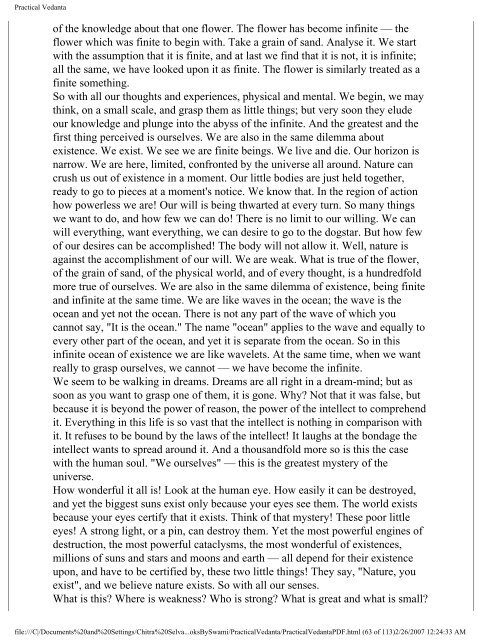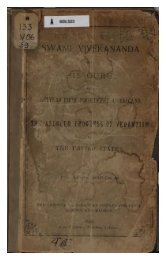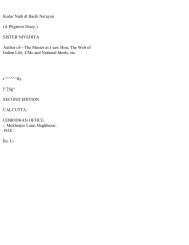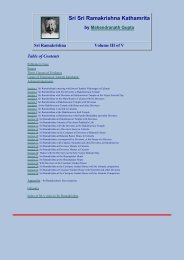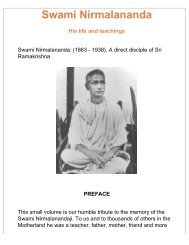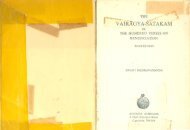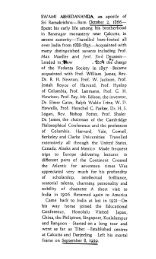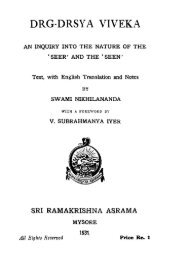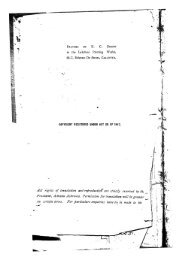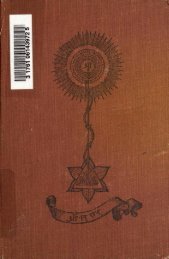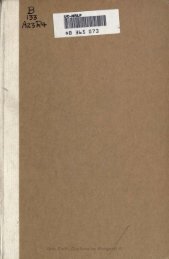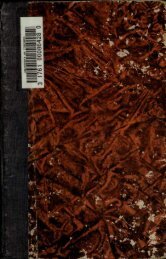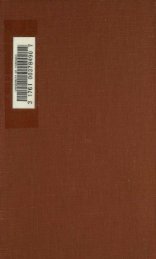<strong>Practical</strong> <strong>Vedanta</strong>that this world is a vain show. Yet again the senses drag hint down, and he beginsas before to eat the sweet and bitter fruits of the world. Again an exceptionallyhard blow comes. His heart becomes open again to divine light; thus gradually heapproaches God, and as he gets nearer and nearer, he finds his old self meltingaway. When he has come near enough, he sees that he is no other than God, andhe exclaims, "He whom I have described to you as the Life of this universe, aspresent in the atom, and in suns and moons — He is the basis of our own life, theSoul of our soul. Nay, thou art That." This is what this Jnana-Yoga teaches. It tellsman that he is essentially divine. It shows to mankind the real unity of being, andthat each one of us is the Lord God Himself, manifested on earth. All of us, fromthe lowest worm that crawls under our feet to the highest beings to whom we lookup with wonder and awe — all are manifestations of the same Lord.Lastly, it is imperative that all these various Yogas should be carried out in,practice; mere theories about them will not do any good. First we have to hearabout them, then we have to think about them. We have to reason the thoughts out,impress them on our minds, and we have to meditate on them, realise them, untilat last they become our whole life. No longer will religion remain a bundle ofideas or theories, nor an intellectual assent; it will enter into our very self. Bymeans of intellectual assent we may today subscribe to many foolish things, andchange our minds altogether tomorrow. But true religion never changes. Religionis realisation; not talk, nor doctrine, nor theories, however beautiful they may be.It is being and becoming, not hearing or acknowledging; it is the whole soulbecoming changed into what it believes. That is religion.<strong>Practical</strong> <strong>Vedanta</strong>7. The Open Secret(Delivered at Los Angeles, Calif., 5th January 1900)Whichever way we turn in trying to understand things in their reality, if weanalyse far enough, we find that at last we come to a peculiar state of things,seemingly a contradiction: something which our reason cannot grasp and yet is afact. We take up something — we know it is finite; but as soon as we begin toanalyse it, it leads us beyond our reason, and we never find an end to all itsqualities, its possibilities, its powers, its relations. It has become infinite. Takeeven a common flower, that is finite enough; but who is there that can say heknows all about the flower? There is no possibility of anyone's getting to the endfile:///C|/Documents%20and%20Settings/Chitra%20Selva...oksBySwami/<strong>Practical</strong><strong>Vedanta</strong>/<strong>Practical</strong><strong>Vedanta</strong>PDF.html (62 of 113)2/26/2007 12:24:33 AM
<strong>Practical</strong> <strong>Vedanta</strong>of the knowledge about that one flower. The flower has become infinite — theflower which was finite to begin with. Take a grain of sand. Analyse it. We startwith the assumption that it is finite, and at last we find that it is not, it is infinite;all the same, we have looked upon it as finite. The flower is similarly treated as afinite something.So with all our thoughts and experiences, physical and mental. We begin, we maythink, on a small scale, and grasp them as little things; but very soon they eludeour knowledge and plunge into the abyss of the infinite. And the greatest and thefirst thing perceived is ourselves. We are also in the same dilemma aboutexistence. We exist. We see we are finite beings. We live and die. Our horizon isnarrow. We are here, limited, confronted by the universe all around. Nature cancrush us out of existence in a moment. Our little bodies are just held together,ready to go to pieces at a moment's notice. We know that. In the region of actionhow powerless we are! Our will is being thwarted at every turn. So many thingswe want to do, and how few we can do! There is no limit to our willing. We canwill everything, want everything, we can desire to go to the dogstar. But how fewof our desires can be accomplished! The body will not allow it. Well, nature isagainst the accomplishment of our will. We are weak. What is true of the flower,of the grain of sand, of the physical world, and of every thought, is a hundredfoldmore true of ourselves. We are also in the same dilemma of existence, being finiteand infinite at the same time. We are like waves in the ocean; the wave is theocean and yet not the ocean. There is not any part of the wave of which youcannot say, "It is the ocean." The name "ocean" applies to the wave and equally toevery other part of the ocean, and yet it is separate from the ocean. So in thisinfinite ocean of existence we are like wavelets. At the same time, when we wantreally to grasp ourselves, we cannot — we have become the infinite.We seem to be walking in dreams. Dreams are all right in a dream-mind; but assoon as you want to grasp one of them, it is gone. Why? Not that it was false, butbecause it is beyond the power of reason, the power of the intellect to comprehendit. Everything in this life is so vast that the intellect is nothing in comparison withit. It refuses to be bound by the laws of the intellect! It laughs at the bondage theintellect wants to spread around it. And a thousandfold more so is this the casewith the human soul. "We ourselves" — this is the greatest mystery of theuniverse.How wonderful it all is! Look at the human eye. How easily it can be destroyed,and yet the biggest suns exist only because your eyes see them. The world existsbecause your eyes certify that it exists. Think of that mystery! These poor littleeyes! A strong light, or a pin, can destroy them. Yet the most powerful engines ofdestruction, the most powerful cataclysms, the most wonderful of existences,millions of suns and stars and moons and earth — all depend for their existenceupon, and have to be certified by, these two little things! They say, "Nature, youexist", and we believe nature exists. So with all our senses.What is this? Where is weakness? Who is strong? What is great and what is small?file:///C|/Documents%20and%20Settings/Chitra%20Selva...oksBySwami/<strong>Practical</strong><strong>Vedanta</strong>/<strong>Practical</strong><strong>Vedanta</strong>PDF.html (63 of 113)2/26/2007 12:24:33 AM
- Page 1 and 2:
Practical VedantaPractical VedantaP
- Page 3 and 4:
Practical Vedantaworld. If I am a s
- Page 5 and 6:
Practical Vedantadifference is only
- Page 7 and 8:
Practical VedantaThe ideal of faith
- Page 9 and 10:
Practical Vedantamoment of our live
- Page 11 and 12: Practical Vedantaof the Christs and
- Page 13 and 14: Practical Vedanta"This life is Brah
- Page 15 and 16: Practical Vedantadark fifteen days,
- Page 17 and 18: Practical Vedantalife. This is the
- Page 19 and 20: Practical Vedantaeverything would b
- Page 21 and 22: Practical Vedantait is only through
- Page 23 and 24: Practical Vedantawhich is that subt
- Page 25 and 26: Practical Vedantanoumenon and pheno
- Page 27 and 28: Practical Vedantato which is the be
- Page 29 and 30: Practical VedantaAbsolute.The finit
- Page 31 and 32: Practical Vedantawhich is not the q
- Page 33 and 34: Practical Vedantaexperience that th
- Page 35 and 36: Practical Vedantafulfilled. The Jiv
- Page 37 and 38: Practical Vedantabetween the pure r
- Page 39 and 40: Practical Vedantacome out straight.
- Page 41 and 42: Practical Vedantawar with one anoth
- Page 43 and 44: Practical Vedantanobody could under
- Page 45 and 46: Practical VedantaMy idea, therefore
- Page 47 and 48: Practical Vedantathe same methods.
- Page 49 and 50: Practical Vedantavarious minds, all
- Page 51 and 52: Practical Vedantabrotherhood; but t
- Page 53 and 54: Practical Vedantabrotherhood, but w
- Page 55 and 56: Practical Vedantawe all go with ves
- Page 57 and 58: Practical Vedantareason. What can y
- Page 59 and 60: Practical Vedantabeen preached in t
- Page 61: Practical Vedantathe husband kisses
- Page 65 and 66: Practical Vedantafor those who only
- Page 67 and 68: Practical Vedantasun exists because
- Page 69 and 70: Practical Vedantaof death was pleas
- Page 71 and 72: Practical VedantaGod. We must learn
- Page 73 and 74: Practical Vedantaa plague comes, it
- Page 75 and 76: Practical VedantaAtman? "As with a
- Page 77 and 78: Practical Vedantathat immortal One,
- Page 79 and 80: Practical Vedantaand the third egoi
- Page 81 and 82: Practical VedantaWitness of the uni
- Page 83 and 84: Practical VedantaPractical Vedanta1
- Page 85 and 86: Practical Vedantaeternal ; every ot
- Page 87 and 88: Practical Vedantafaculty, Buddhi, w
- Page 89 and 90: Practical VedantaPractical Vedanta1
- Page 91 and 92: Practical Vedantastepping-stone to
- Page 93 and 94: Practical Vedantarecognition? Findi
- Page 95 and 96: Practical Vedantasentient." This is
- Page 97 and 98: Practical Vedantaessentially differ
- Page 99 and 100: Practical Vedantaexistence is limit
- Page 101 and 102: Practical Vedantalive, for I am lif
- Page 103 and 104: Practical Vedantasee from Kapila's
- Page 105 and 106: Practical Vedantalimitation, but th
- Page 107 and 108: Practical Vedantaperfect, infinite,
- Page 109 and 110: Practical Vedantaindividuality, of
- Page 111 and 112: Practical Vedantarepeat [something]
- Page 113:
Practical Vedantaperson who dies in


